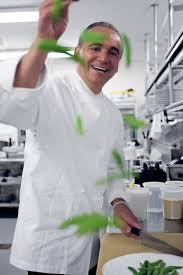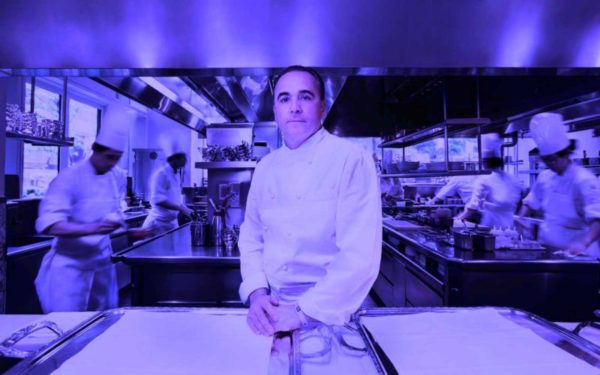Jean-Georges Vongerichten, the decorated chef and restaurateur, caused a stir this week when he revealed on stage at the Philly Chef Conference that he’d once broken his dishwasher’s nose because of his poor work ethic. The moderator offered him the opportunity to express remorse for an incident which occurred over thirty years ago, early on in his promising career. Instead, he defended his actions, and only walked back his comments after the backlash went viral.
Chef Vongerichten’s stoicism came as no surprise to those of us who work in the restaurant industry. We’ve become conditioned to accepting tension and violence as an inherent hazard of the workplace. Asking for forgiveness is considered a sign of weakness.
Attacking the self-worth of subordinates, as military officers do, is a popular tactic chefs employ to encourage productivity. What Chef Vongerichten’s comments make very clear is an almost universal truth of restaurant life: Chefs, when left unchecked, weaponize discipline. But instead of wondering why these chefs act this way, we should be asking ourselves why we continue to tolerate their behavior.
Jean-Georges boasts in his book, JGV: A Life in Twelve Recipes, that he and his former dishwasher are still friends. Knowing the tribalism that exists in restaurants, it’s believable that there’s no ill will between them. After these abuses occur, most cooks are trained to “get over it” because… well… the food isn’t gonna cook itself.
There’s an unwritten code that exists in a restaurant kitchen, albeit an antiquated one. Cowering in the face of anger indicates one’s lack of fitness for the chef’s profession. Could this be the reason that so many young chefs are covered in tattoos? Perhaps the Bourdain Effect has romanticized the poetic ideal of the battle-tested chef. Cooks working their way up the chain of command learn that scars earn you valor behind the line, and there is no gain without pain. But at what cost?
Jean-Georges already knows the cost because he’s undoubtedly worked under the tutelage of many male chefs (likely of the older French variety) who were probably louder and more violent than he’s ever been. One wonders whether he might credit being on the receiving end of that tough love for his own resilience—the way a father that metes out discipline might reflect upon learning discipline from his own father.
Being a chef in charge of a team is a lot like parenting. In the same way that every parent has a different approach to raising his children, chefs also do with their apprentices. As with child rearing, there are often times when disciple becomes abusive, and the children suffer for it. They feel inadequate. They blame themselves. In turn, they abuse others.

Chef Vongerichten’s statements expose the real problem which is that so many people who work in executive roles in restaurants believe that abusing staff is the most effective way to keep them motivated. Busy restaurants don’t have the luxury of having a staff with a passive work ethic. So they recruit people with a high tolerance for adversity. One of the ways of evaluating a cook’s mettle is to deploy these stress tests and separate the wheat from the chaff. Chef’s will burn down the fields for the sake of saving a few sturdy plants.
It’s hard to believe that this “Come To Jesus” moment for male chefs will have any staying power. The most malicious behavior in restaurants always occurs when no one is looking. Changing the culture requires the type of humility that restaurant professionals like JGV are often too proud to show, or they are only wiling to show it when they get caught misbehaving.
Spectators at the Philly Chef Conference reported that Chef Vongerichten seemed like he expected the audience to be amused when he justified punching his dishwasher. Restaurants exist in a fragile, oxygen-deprived bubble. Air is for the guests. We often do nasty things to each other and convince ourselves that it’s all a part of restaurant life. When the bubble finally bursts, exposing our misdeeds, even we are sometimes shocked by our own behavior. But it’s hard to teach old dogs new tricks when that’s the way they were raised.
Ask Jean-Georges.


I don’t personally know anyone who condones physical abuse in the kitchen, but having been brought up in an old-school environment, I’ve lived the differences between then and now in how chefs and cooks do their jobs. I’m fortunate to have had the experiences I encountered early on, and I know they made me a better cook, chef, and person.Things change, though. Now we do our best to find a happy middle ground where everyone can feel they’re doing a good job learning, teaching, and serving the guests, while still maintaining the discipline required by the nature of our work.… Read more »
[…] that reflected positively on the industry. Chef Jean-Georges Vongerichten proudly boasted about punching a former dishwasher. The James Beard Foundation floundered in its handling of the results of its 2020 Awards after […]